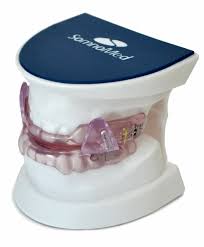Snoring is often regarded as a social problem, not a medical problem. These hoarse or harsh sounds cause you more harm than embarrassment or your spouse’s good night’s sleep because they can lead to serious health problems. Snoring occurs when the muscles of the upper throat restrict the airway and reduce the amount of air that can be inhaled. Moreover, reduction in airflow lowers the amount of oxygen available to the body during sleep, leading to troublesome sleep apnea symptoms.
Disturbing the sleep patterns of those beside you is just the tip of the iceberg because it affects the quality of your sleep as well. The truth is many people who snore don’t realize that what they are experiencing is a medical condition called Obstructive Sleep Apnea or OSA. So, if your partner notices that you usually snore loudly or sometimes stop breathing altogether while you sleep, it is best to seek medical help.

How Does Oral Appliance Therapy Work?
If you were diagnosed with obstructive sleep apnea, your doctor would offer you different treatment options. While Continuous positive airway pressure (CPAP) is the standard for treating this condition, there’s a chance that it won’t work for you. As an alternative, an oral appliance is increasingly recommended to patients with mild to moderate obstructive sleep apnea. It is a device fitted to your teeth and worn in your mouth while you sleep, which resembles an athlete’s mouthguard. It helps keep the airway open during sleep, which may improve your breathing.
Different Types of Oral Appliances for Sleep Apnea
As an alternative obstructive sleep apnea treatment, oral appliances have become available in multiple options. Generally, they’re made out of different plastic, metal, and acrylic. They come in different shapes, sizes, and colours to fit the needs of the user. The most popular types are mandibular advancing devices (MADs), tongue retaining devices (TRDs) or bite blocks, uvulopalatal devices (UPs), palatal devices (Pd), and mandibular repositioning devices (MRDs).
Dental appliances can be either fixed or removable. Fixed appliances stay in place all the time and don’t move around when you speak or eat, but they might need to be adjusted periodically by an oral health care professional. Removable appliances can be taken out of the mouth when it is convenient or necessary, such as when you brush your teeth or eat solid foods.
Mandibular Advancement Devices vs. Tongue Retaining Devices
Mandibular advancement devices (MADs) are oral appliances that offer effective treatment options for some cases of OSA. These are made of moulded hard plastic that snaps over your upper and lower teeth. They can be tightened with metal screws and hinges to push your jaw forward. The oral appliance can prevent the upper airway from collapsing by moving the lower jaw (mandible) slightly forward (advanced) during sleep. While you can find MADs at your local store or online, this specific medical design works best if moulded from your teeth and jaw for a more convenient and custom fit.
Tongue retaining devices (TRDs) are soft plastic splints that grip your tongue and prevent it from falling back at your throat as you sleep. Back sleepers usually snore because their tongue is blocking the airway. Some find these oral devices quite uncomfortable because they make their mouths dry throughout the night.
Benefits of Oral Appliance Therapy:
- It is comfortable and easy to wear.
- It is convenient and portable because you can take it anywhere or when travelling.
- Works without electricity.
- It is discrete and silent.
- Easy to care for and fits easily into your lifestyle.
- It is the best alternative to CPAP therapy.
- You can talk and drink while wearing a fixed appliance.
- The suitable oral treatment for patients with claustrophobia.
Contact Pacific Sleep Care
If you need a solution for ending your frequent snoring, treating obstructive sleep apnea or improving the quality of your sleep, don’t hesitate to contact us. Our highly trained and dedicated team works with physicians on Vancouver Island to help you.
Interview with Sleep Dentist Dr. Sharnell Muir DMD
Here is the first segment of an interview with our Sleep Dentist Dr. Sharnell Muir DMD, Diplomate American Academy of Sleep Medicine. Dr. Muir is in our clinics one day per month. Call or email to book a consultation.


